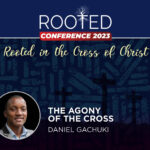In his book, Spectacular Atonement, Dr Falconer articulates the biblical doctrine of the atonement and explores its relevance for Africans. Beneath this major premise is his proposition that “African Christianity should employ that which is useful and biblical from within its own African worldview to communicate the cross of Christ without compromising the gospel” (p xii). He is persuaded that the atonement is profoundly meaningful for African people. And, if rightly understood and taught, he argues that it has inescapable implications for African metaphysics and worldview. He also contends that “the church should live Jesus’ message and mission within its cultural background” (p143). The recipient culture is not to be negated, nor should people be forced to abandon it. He is unsparing in how he fleshes this argument out.
An Outline of the Book
This book is broadly divided into two parts. In the first, Falconer ably demonstrates that there is an unmistakable harmony and complementarity between penal substitution and Christus Victor as views of the atonement. He proves this by shining the floodlight of the New Testament on various Old Testament texts. He furthers the case by doing a quick but helpful survey of church history, starting with the Patristics, then the Reformers, and down to today. When he is done showing how these two views dovetail, one cannot help but concede that the atonement is indeed spectacular! Jesus Christ is the Lion-Lamb who conquers sin, death, and Satan by means of his substitutionary death. This first part of the book is invaluable for anyone who wishes to get a better handle on the atonement because of its stellar biblical and historical grounding.
Falconer demonstrates awareness that Africans are not one people and culture is not monolithic.
In the second part of Spectacular Atonement, Falconer unpacks what he believes to be the implications of the atonement for Africans, both spiritually and practically. Since in Africa spirituality is pervasive, he proposes that “our responsibility is to discern the overarching predicament of our time to understand the question behind the questions of our cultural and philosophical context and to engage them with a meaningful and sufficient story of atonement” (p72). This calls for an understanding of the presuppositions of African Traditional Religions (ATR). Falconer demonstrates awareness that Africans are not one people and culture is not monolithic. As such, he tackles concepts that apply broadly across cultures. His willingness and ability to interact usefully and generously with other African authors on this subject without coming off as excessively academic is commendable.
African Spirituality Examined
This work gives penetrating insights into African culture and worldview. Such anthropological awareness is definitely useful as we seek to reach the lost in Africa. Falconer highlights the major tenets of African spirituality, namely: holism, spiritualism, dynamism, communalism, and fatalism. He also underscores the fact that African religion has a natural propensity towards the pursuit of the supernatural and the mystical. This largely sheds light on why syncretistic African Initiated Churches and pentecostal excesses are commonplace across Africa.
Essentially, the ultimate African longing as deciphered from their worldview is that of total harmony in the cosmos. This is where the incessant drive for liberation from evil powers, death and suffering is anchored. In the end, as Falconer clarifies, Christianity holds up a better promise, not merely of a “cosmological balance, but of a new creation” (p77).

Spectacular Atonement: Envisioning the Cross of Christ in an African Perspective
Robert Falconer
Spectacular Atonement: Envisioning the Cross of Christ in an African Perspective
Robert Falconer
There are many books about the cross of Christ, but few are written from an African perspective or with an African context in mind. In this book, Dr Robert Falconer offers the reader a holistic understanding of Jesus’ atoning work that powerfully addresses African realities and concerns.
Grounded in scripture and Christian theology, this book gives careful attention to the implications of the atonement for African traditional spirituality. Presenting a biblical perspective of the cross—one rooted in penal substitution and Christus Victor theology—Falconer demonstrates Christ’s power in all aspects of our lives, including over ancestors, evil spirits, witchcraft, and sin.
This book provides a deeper understanding of contextual issues facing the African church, while also demonstrating the role of the atonement in addressing our cultural concerns and restoring the hope of liberty, reconciliation, redemption, and resurrection.
African religion has a natural propensity towards the pursuit of the supernatural and the mystical.
Tentative Bridges Between ATR and Christianity
Falconer also posits that concepts such as atonement, scapegoat, and sacrifices already present in the ATR make for good bridges to Christianity. He does however urge caution since the Judeo-Christian God is not wholly similar to the African “God.” While the latter is “preexistent, omniscient, transcendent and immanent…he may also be viewed in a pantheistic, polytheistic, anthropomorphic manner as a Supreme Power or Supreme being. [Thus] if we wish to understand the cross of Christ in an African perspective, we cannot rely on the traditional concept of an African God for Christ is absent from such a God” (p90).
God has already started the process of remedying all the disharmony and chaos of creation.
Such radical differences are also seen between the Judeo-Christian and African concepts of evil, sin, suffering and Satan. Christianity additionally teaches that God has already started the process of remedying all the disharmony and chaos of creation itself through Christ (Romans 8:19-25; Colossians 1:19-20); and that salvation gives the Christian a new identity (2 Corinthians 5:17). Thus, “to become part of this new community and humanity, one must leave behind all tribal gods and turn to Christ” (p142).
Should We Call Jesus the Proto-Ancestor?
Lastly, Spectacular Atonement works to apply the doctrine of the atonement to the African. In his effort to do so, he proposes the concept of “Ancestor-Christology,” presenting Jesus to Africans as the “Proto-ancestor,” a supreme ancestor common to “every tribe and people and nation” (p104), because of his incarnation. This is largely due to his commitment to the belief that ancestors lie at the very core of African culture and spirituality and that “removing that would be to buckle the entire fabric” (p97).
While I think this approach is well intentioned, I cannot help but wonder whether it carries potential for confusion. I say this because generally, when an African thinks about ancestors they don’t merely think about progenitors and mediators; they also think veneration, spiritism, and libations. I fully concur with Reed and Mtukwa when they affirm that “Africa is in desperate need, not of a Jesus shaped in an African image, but of an African shaped in Jesus’ image” (p100).
When Africans think about ancestors they don’t merely think about progenitors; they also think veneration, spiritism, and libations.
In truth, ATR may have elements that coincide with the one true religion. But this is because of God’s general revelation, and not because of its inherent goodness. I therefore believe that any kind of theological contextualisation that slides away from historical orthodox Christianity is bound to go awry. As we follow Byang Kato’s counsel to let “African Christians be Christian Africans,” meaning ardent Christians that are authentically African, we also need a theology that is robustly biblical, Confessional, and historical. In spite of my own discomfort with Falconer’s proposal of “Ancestor-Christology,” this book affords us the opportunity to see a man who loves and knows the true gospel, grappling with how best to apply a major doctrine like the atonement for Africans.














